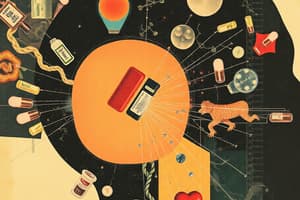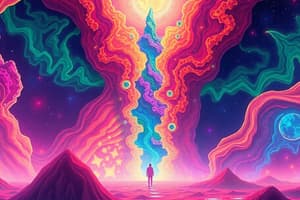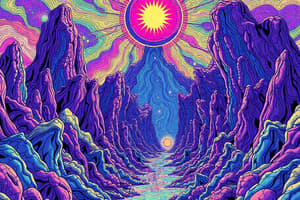Podcast
Questions and Answers
What is the primary psychoactive substance in psilocybin mushrooms after ingestion?
What is the primary psychoactive substance in psilocybin mushrooms after ingestion?
- LSD
- Psilocin (correct)
- Mescaline
- DMT
Which psychedelic drug is derived from the peyote cactus and has been traditionally used in Native American rituals?
Which psychedelic drug is derived from the peyote cactus and has been traditionally used in Native American rituals?
- DMT
- Psilocybin
- LSD
- Mescaline (correct)
What is the main effect of smoking DMT?
What is the main effect of smoking DMT?
- Extended periods of cognitive clarity
- A mild sensation of relaxation
- Altered body function without hallucinations
- A brief but intense hallucinatory experience (correct)
What substance is sythesized from ergot and is known for its involvement in creating powerful hallucinogenic experiences?
What substance is sythesized from ergot and is known for its involvement in creating powerful hallucinogenic experiences?
What is the traditional use of ayahuasca among indigenous peoples in the Amazon?
What is the traditional use of ayahuasca among indigenous peoples in the Amazon?
Which receptors are primarily associated with the psychedelic effects of hallucinogenic drugs?
Which receptors are primarily associated with the psychedelic effects of hallucinogenic drugs?
What is the role of the 'trigger population' in the neural circuitry associated with psychedelic drugs?
What is the role of the 'trigger population' in the neural circuitry associated with psychedelic drugs?
Which of the following hallucinogens acts primarily through the opioid pathways rather than serotonergic pathways?
Which of the following hallucinogens acts primarily through the opioid pathways rather than serotonergic pathways?
What psychological conditions are being explored for treatment with psychedelic drug therapy?
What psychological conditions are being explored for treatment with psychedelic drug therapy?
Which phenomenon may occur due to a high dose of psychedelic drugs?
Which phenomenon may occur due to a high dose of psychedelic drugs?
What impact do psychedelics have on the default mode network (DMN)?
What impact do psychedelics have on the default mode network (DMN)?
What common psychiatric symptom can high doses of psychedelics mimic?
What common psychiatric symptom can high doses of psychedelics mimic?
Which substance is known to produce a dissociated state often referred to as the 'K-hole'?
Which substance is known to produce a dissociated state often referred to as the 'K-hole'?
What is the primary effect of high doses of ibogaine?
What is the primary effect of high doses of ibogaine?
What psychological approach is described as inducing 'psycholysis' using LSD?
What psychological approach is described as inducing 'psycholysis' using LSD?
Which physiological response is more likely associated with the use of mushrooms and peyote?
Which physiological response is more likely associated with the use of mushrooms and peyote?
What is a characteristic of the 5-HT2A receptor in relation to hallucinogens?
What is a characteristic of the 5-HT2A receptor in relation to hallucinogens?
What is the duration of effects when drugs are taken orally, according to the approximate time frame?
What is the duration of effects when drugs are taken orally, according to the approximate time frame?
What describes a 'good trip' in the context of psychedelic experiences?
What describes a 'good trip' in the context of psychedelic experiences?
What type of receptor antagonist are PCP and ketamine?
What type of receptor antagonist are PCP and ketamine?
What is a significant effect of NMDA receptor blockade on cortical GABAergic interneurons?
What is a significant effect of NMDA receptor blockade on cortical GABAergic interneurons?
Which of the following symptoms is NOT typically reproduced by PCP or ketamine use?
Which of the following symptoms is NOT typically reproduced by PCP or ketamine use?
Chronic use of PCP can lead to which of the following conditions?
Chronic use of PCP can lead to which of the following conditions?
What therapeutic use is ketamine effective for?
What therapeutic use is ketamine effective for?
What is the primary psychoactive agent formed from dextromethorphan?
What is the primary psychoactive agent formed from dextromethorphan?
Which cannabinoid is primarily used for reducing seizures in pediatric epilepsy?
Which cannabinoid is primarily used for reducing seizures in pediatric epilepsy?
Chronic cannabis use can lead to which of the following psychological effects?
Chronic cannabis use can lead to which of the following psychological effects?
How do cannabinoids interact with the brain's reward system?
How do cannabinoids interact with the brain's reward system?
What effect can high doses of marijuana cause?
What effect can high doses of marijuana cause?
What is the duration when withdrawal effects from cannabis are greatest after abstinence?
What is the duration when withdrawal effects from cannabis are greatest after abstinence?
Which cognitive domain shows impairment after long-term cannabis use, particularly after 2 weeks of abstinence?
Which cognitive domain shows impairment after long-term cannabis use, particularly after 2 weeks of abstinence?
What possible change may occur in the brain due to chronic cannabis use, particularly in adolescents?
What possible change may occur in the brain due to chronic cannabis use, particularly in adolescents?
What is a common characteristic of schizophrenia as defined by DSM-V?
What is a common characteristic of schizophrenia as defined by DSM-V?
Which of the following statements about schizophrenia is true?
Which of the following statements about schizophrenia is true?
How do personality characteristics relate to marijuana use according to the discussed content?
How do personality characteristics relate to marijuana use according to the discussed content?
What cognitive function may be potentially impaired with chronic cannabis use, depending on age of onset and frequency of use?
What cognitive function may be potentially impaired with chronic cannabis use, depending on age of onset and frequency of use?
What is a characteristic of the positive symptoms of schizophrenia?
What is a characteristic of the positive symptoms of schizophrenia?
What might occur as a result of prolonged cannabis use starting in adolescence?
What might occur as a result of prolonged cannabis use starting in adolescence?
What can be a consequence of impaired inhibitory control due to cannabis use?
What can be a consequence of impaired inhibitory control due to cannabis use?
What brain abnormality is commonly observed in individuals with schizophrenia?
What brain abnormality is commonly observed in individuals with schizophrenia?
How might early life stress influence schizophrenia risk?
How might early life stress influence schizophrenia risk?
What genetic factor is associated with the risk of developing schizophrenia?
What genetic factor is associated with the risk of developing schizophrenia?
What is one potential consequence of prenatal inflammation according to models of schizophrenia?
What is one potential consequence of prenatal inflammation according to models of schizophrenia?
Which model is used to study sensory-filtering deficits in schizophrenia?
Which model is used to study sensory-filtering deficits in schizophrenia?
Flashcards
What are psychedelic drugs?
What are psychedelic drugs?
Psychoactive substances that cause perceptual changes, hallucinations, altered awareness of the mind and body, and cognitive distortions. They do not cause a state of toxic delirium.
What is mescaline?
What is mescaline?
A psychedelic drug found in the peyote cactus. It's the active compound in the mescal button, which is the dried top of the cactus.
What is psilocybin?
What is psilocybin?
An alkaloid found in magic mushrooms. It's converted to psilocin in the body, which is the psychoactive agent.
What is DMT?
What is DMT?
Signup and view all the flashcards
What is LSD?
What is LSD?
Signup and view all the flashcards
Psycholytic therapy
Psycholytic therapy
Signup and view all the flashcards
Psychedelic therapy
Psychedelic therapy
Signup and view all the flashcards
Ibogaine: Low doses
Ibogaine: Low doses
Signup and view all the flashcards
Ibogaine: High doses
Ibogaine: High doses
Signup and view all the flashcards
Synesthesia
Synesthesia
Signup and view all the flashcards
5-HT2A Receptor
5-HT2A Receptor
Signup and view all the flashcards
How do 5-HT2A receptors contribute to psychedelic effects?
How do 5-HT2A receptors contribute to psychedelic effects?
Signup and view all the flashcards
What is the 'trigger population' in the brain?
What is the 'trigger population' in the brain?
Signup and view all the flashcards
How do psychedelics disrupt brain activity?
How do psychedelics disrupt brain activity?
Signup and view all the flashcards
How is the default mode network (DMN) affected by psychedelics?
How is the default mode network (DMN) affected by psychedelics?
Signup and view all the flashcards
What are some proposed medical uses for psychedelics?
What are some proposed medical uses for psychedelics?
Signup and view all the flashcards
Describe psychedelic tolerance.
Describe psychedelic tolerance.
Signup and view all the flashcards
What are 'bad trips'?
What are 'bad trips'?
Signup and view all the flashcards
What are noncompetitive antagonists?
What are noncompetitive antagonists?
Signup and view all the flashcards
What are uncompetitive antagonists?
What are uncompetitive antagonists?
Signup and view all the flashcards
How do PCP and ketamine affect the NMDA receptor?
How do PCP and ketamine affect the NMDA receptor?
Signup and view all the flashcards
What is the glutamate hypothesis of schizophrenia?
What is the glutamate hypothesis of schizophrenia?
Signup and view all the flashcards
How do PCP and ketamine potentially induce psychosis?
How do PCP and ketamine potentially induce psychosis?
Signup and view all the flashcards
How do PCP and ketamine affect the reward system?
How do PCP and ketamine affect the reward system?
Signup and view all the flashcards
What are some other uncompetitive NMDA antagonists?
What are some other uncompetitive NMDA antagonists?
Signup and view all the flashcards
How does cannabis affect the brain?
How does cannabis affect the brain?
Signup and view all the flashcards
How does rimonabant affect cannabis intoxication?
How does rimonabant affect cannabis intoxication?
Signup and view all the flashcards
How does chronic cannabis use lead to CUD?
How does chronic cannabis use lead to CUD?
Signup and view all the flashcards
Cannabis Withdrawal Symptoms
Cannabis Withdrawal Symptoms
Signup and view all the flashcards
Long-Term Cannabis Use Effects
Long-Term Cannabis Use Effects
Signup and view all the flashcards
Amotivational Syndrome
Amotivational Syndrome
Signup and view all the flashcards
Acute Cannabis Effects on Cognition
Acute Cannabis Effects on Cognition
Signup and view all the flashcards
Chronic Cannabis Effects on Cognition
Chronic Cannabis Effects on Cognition
Signup and view all the flashcards
Brain Changes with Chronic Cannabis Use
Brain Changes with Chronic Cannabis Use
Signup and view all the flashcards
Cannabis Use Disorder (CUD)
Cannabis Use Disorder (CUD)
Signup and view all the flashcards
Psychosis
Psychosis
Signup and view all the flashcards
Schizophrenia
Schizophrenia
Signup and view all the flashcards
Schizophrenia Diagnosis
Schizophrenia Diagnosis
Signup and view all the flashcards
What is hypofrontality?
What is hypofrontality?
Signup and view all the flashcards
How does the hippocampus play a role in schizophrenia?
How does the hippocampus play a role in schizophrenia?
Signup and view all the flashcards
What is the 'two-hit' model of schizophrenia development?
What is the 'two-hit' model of schizophrenia development?
Signup and view all the flashcards
What is the prenatal inflammation model of schizophrenia?
What is the prenatal inflammation model of schizophrenia?
Signup and view all the flashcards
How do preclinical models of schizophrenia help researchers?
How do preclinical models of schizophrenia help researchers?
Signup and view all the flashcards
Study Notes
Psychedelic Drugs
- Psychedelic drugs are psychoactive substances that cause perceptual changes, visual hallucinations, altered awareness of the mind and body, and cognitive distortions, without toxic delirium.
- Many are synthesized from plants or plant-derived compounds.
- Examples include LSD, mescaline, psilocybin, bufotenine, DMT, 5-MeODMT, salvinorin (from Salvia), and ibogaine.
Mescaline
- Mescaline is found in the peyote cactus.
- Peyote buttons (dried tops) are chewed raw or cooked.
- Native Americans use peyote in religious and healing rituals.
- Pure mescaline can be synthesized, becoming popular in the 1960s.
Psilocybin
- Psilocybin is an alkaloid found in various mushroom species.
- It's consumed dried and raw, or as a tea.
- Psilocybin converts to psilocin (the psychoactive compound) in the body.
- The use of psilocybin dates back thousands of years.
- The Harvard Marsh Chapel Experiment used psilocybin to induce profound religious experiences in graduate students.
DMT and Ayahuasca
- DMT, 5-MeO-DMT, and bufotenine are found in South American plants.
- When smoked or snorted, DMT produces a brief (30-minute) intense hallucinatory experience.
- Synthetic DMT analogs are orally active.
- Ayahuasca is a hallucinogenic drink made from plants containing DMT and alkaloids (β-carbolines) that inhibit MAO activity.
- Ayahuasca use dates to pre-Columbian times, used in spiritual/religious ceremonies.
Lysergic Acid Diethylamide (LSD)
- LSD is a synthetic drug derived from ergot alkaloids (in the parasitic rye fungus).
- Long-term ergot poisoning causes ergotism (convulsions and gangrene).
- Ergot alkaloids can also trigger labor and reduce post-birth uterine hemorrhage.
- LSD was initially synthesized in search for circulatory and respiratory stimulants.
- Some researchers explored LSD in psychotherapy and psychoanalysis.
Ibogaine
- Ibogaine comes from the bark and roots of a West African shrub.
- It's chewed or made into a powder.
- Low doses are psychostimulants (increasing energy, reducing hunger, creating euphoria).
- High doses induce psychedelic effects.
- Ibogaine, under controlled conditions, can counteract opioid withdrawal symptoms and cravings.
Salvinorin A and Ketocyclazocine
- Salvinorin A is a psychoactive compound found in Salvia divinorum (sage of the diviners).
- It's historically used in religious rituals by Mazatec shamans.
- The leaves are chewed or extracted, absorbed orally or smoked.
- Salvinorin A is inactivated in the gastrointestinal tract.
- Salvinorin A and ketocyclazocine produce vivid hallucinations, out-of-body experiences, and similar effects to other hallucinogens.
- They act through kappa opioid receptors.
General Psychedelic Effects
- Potency varies among types.
- Oral effects begin in 30-90 minutes, lasting from minutes to hours.
- A "trip" involves four phases: onset, plateau, peak, and comedown.
- Users experience visual hallucinations, altered time perception, depersonalization, strong emotions, and disrupted logic.
- Synesthesia (crossing of senses) is possible.
- Trips can be mystical or disturbing.
Altered States of Consciousness (ASC) Rating Scale
- The ASC scale measures five dimensions of experience: oceanic boundlessness, ego-disintegration anxiety, visionary restructuralization, reduced vigilance, and auditory alterations.
- Subdimensions provide more detailed analysis of drug-induced reactions.
Physiological Responses
- Physiological responses include sympathetic nervous system activation, dizziness, nausea, and vomiting (possible with mushrooms and peyote).
Chemical Structures
- Many psychedelic drugs share a serotonin-like (indolamine) molecular structure (LSD, psilocybin, psilocin, DMT, 5-MeO-DMT, ibogaine).
- Some have a catecholamine-like structure (mescaline, synthetic phenethylamines).
Neurobiology Mechanisms
- 5-HT2A receptor activation is crucial for many effects.
- Psychedelics activate a trigger population of glutamatergic neurons, disrupting a brain loop.
- Some hallucinogens act on opioid pathways.
Medical Uses
- LSD was previously studied as an alcohol treatment.
- Recent research explores long-term psychological effects and potential for treating depression, OCD, and PTSD.
Adverse Reactions
- Psychedelics are not typically addictive but a few users may meet diagnostic criteria for hallucinogen use disorder.
- Tolerance develops with repeated use, potentially leading to receptor downregulation.
- Adverse effects include bad trips, flashbacks, and hallucinogen persisting perception disorder (HPPD).
- High doses can cause toxic reactions.
Dissociative Anesthetics (PCP and Ketamine)
- PCP and ketamine are uncompetitive NMDA antagonists.
- PCP was initially developed as an anesthetic but has significant adverse effects.
- Ketamine is a safer alternative, used clinically and in veterinary medicine.
- Both produce a "dissociated state" at anesthetic doses.
- Subjective experiences include light, visions, loss of time sense, body distortions, and feelings of detachment.
Pharmacology of PCP and Ketamine
- They block ion flow in NMDA receptors.
Models of Schizophrenia
- LSD and PCP/ketamine models have been developed to study schizophrenia.
- The glutamate hypothesis suggests that hypofunction of the glutamatergic system contributes to schizophrenia.
Recreational Use and Chronic Effects
- PCP and ketamine have potential for recreational use.
- Chronic use can lead to urological issues, GI disturbances, cognitive impairment, and possible psychosis.
- Alternative uses for chronic pain/depression.
Cannabis
- Cannabis exhibits stimulant and depressant effects, with potential for hallucinogen-like effects.
- Medicinal uses vary depending on cannabinoid composition (THC, CBD).
- Consumption produces dose-dependent intoxication with a series of stages.
- Cannabis impairment of learning/memory is related to effects on the glutamatergic system.
Cannabis Use Disorder (CUD)
- Regular users exhibit tolerance and cognitive impairment.
- Mechanisms may include CB1 receptor desensitization, reduced glutamate, striatal dopaminergic dysfunction, and withdrawal symptoms (similar to nicotine).
Long-Term Cannabis Use Effects
- Long-term use can impact cognitive domains, especially if initiated in adolescence.
- Possible link between early cannabis use and reduced educational/occupational achievement.
Brain Changes with Long-Term Use
- Cannabis use is associated with changes in brain structure (volume) and function.
Psychoses and Antipsychotic Medications
- Psychoses are conditions involving difficulty distinguishing reality.
- Antipsychotic medications treat disorders of the schizophrenia spectrum.
- Schizophrenia features both positive (delusions, hallucinations) and negative (reduced emotional expression) symptoms.
Diagnosing Schizophrenia
- Diagnoses can be challenging due to varied symptom patterns.
- Symptoms change over time and intensity.
Schizophrenia Brain Abnormalities
- Brain imaging shows structural changes (atrophy, ventricle enlargement).
- Functional changes exist, such as reduced prefrontal cortex activity or changes in abnormal activation.
- Possible associations between immune dysfunction and schizophrenia.
Genetic and Developmental Aspects
- Strong genetic component in schizophrenia.
- Early life stress can lead to epigenetic changes.
- Neurodevelopmental factors are crucial (e.g., prenatal inflammation, viral infections).
Models of Schizophrenia
- Animal models investigate specific aspects of the disorder.
Dopamine Hypothesis
- The dopamine imbalance hypothesis suggests positive symptoms relate to excessive mesolimbic dopamine activity; negative symptoms are due to reduced mesocortical dopamine.
Glutamate and Other Neurotransmitters
- The glutamate hypothesis points to inadequate glutamate levels.
Neuroleptics and Antipsychotics
- Antipsychotics are used to treat schizophrenia, with differing effects on individuals.
- Classic neuroleptics (phenothiazines, butyrophenones) have significant side effects.
- Newer atypical antipsychotics are sometimes more effective with fewer side effects.
Antipsychotic Mechanisms
- Dopamine receptor antagonism is a key mechanism of antipsychotic action.
- Antipsychotics affect several neurotransmitter receptors.
Antipsychotic Side Effects
- Side effects, such as Parkinsonian symptoms, neuroendocrine effects, and tardive dyskinesia, can be significant.
Atypical Antipsychotics
- Atypical antipsychotics have different mechanisms and/or affect other receptors.
Clinical Trials
- Pragmatic clinical trials offer real-world insights.
- Some trials have found limitations in effectiveness of newer antipsychotics.
Potential New Approaches
- There are a range of research directions attempting to address the challenges of treating schizophrenia.
Studying That Suits You
Use AI to generate personalized quizzes and flashcards to suit your learning preferences.




